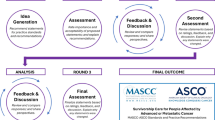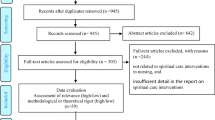Abstract
Purpose
Taking care of cancer patients and treating them are among major challenges in the field of health. Several studies have shown that promotion of hope is an efficient strategy for effectively treating this group of patients, reducing their symptoms, and improving the quality of their life. It seems that spiritual care can boost hope in these patients. This study aims to determine the effects of nursing care based on the Support-Based Spiritual Care Model on boosting hope among women with breast cancer.
Methods
In this controlled clinical trial, 72 patients with breast cancer were selected through consecutive sampling and randomly assigned to two control and intervention groups (n = 36 in each group) based on four randomized blocks. The intervention was carried out based on the Support-Based Spiritual Care Model for the patients and their main caregivers in six sessions. Besides, the Snyder’s hope scale was completed before and 1 month after the intervention by the participants in the intervention and control groups.
Results
The results of the independent samples t-test showed no significant difference in the mean scores of hope between the intervention and control groups before the intervention (P > 0.05). However, after the intervention, the mean scores of hope for the intervention and control groups were 46.71 ± 4.61 and 40.40 ± 5.42, respectively, showing a significant intergroup difference as verified by the independent samples t-test (P < 0.05).
Conclusion
According to the results of this study, providing nursing care based on the Support-Based Spiritual Care Model can raise hope in patients with breast cancer.
Clinical implications
Healthcare professionals can boost hope in cancer patients through proper planning and adequate support in providing nursing care based on the proposed model.

Similar content being viewed by others
Data availability
The datasets used and/or analyzed during the current study are to be provided by the corresponding author upon request.
Code availability
Not applicable.
References
Siegel RL, Miller KD, Jemal A (2017) Cancer statistics, 2017. CA Cancer J Clin 67(1):7–30. https://doi.org/10.3322/caac.21387
Elahi N, Imanian M, Zarea K, Ahmadzadeh A, Jahromi MK (2017) Effect of continuous care model on body image among breast cancer patients undergoing chemotherapy: a clinical trial. Int J Cancer Manag 10(7):8104. https://doi.org/10.5812/ijcm.8104
WHO, Breast cancer, 2019, https://www.who.int/cancer/prevention/diagnosis-screening/breast-cancer/en/
Pourfarzi F, Fouladi N, Amani F, Ahari SS, Roshani Z, Alimohammadi S (2016) Factors affecting preferences of Iranian women for breast cancer screening based on marketing mix components. Asian Pac J Cancer Prev 17(8):3939–3943
Mousavi SM, Gouya MM, Ramazani R, Davanlou M, Hajsadeghi N, Seddighi Z (2008) Cancer incidence and mortality in Iran. Ann Oncol 20(3):556–563. https://doi.org/10.1093/annonc/mdn642
Bray F, Ferlay J, Soerjomataram I, Siegel RL, Torre LA, Jemal A (2018) Global cancer statistics 2018: globocan estimates of incidence and mortality worldwide for 36 cancers in 185 countries. CA Cancer J Clin 68(6):394–424. https://doi.org/10.3322/caac.21492
Seyedrasooli A, Rahmani A, Howard F, Zamanzadeh V, Mohammadpoorasl A, Aliashrafi R (2014) Iranian cancer patient perceptions of prognosis and the relationship to hope. Asian Pac J Cancer Prev 15(15):6205–6210
Abdollahi A, Panahipour H, Hosseinian S, Allen KA (2019) The effects of perceived stress on hope in women with breast cancer and the role of psychological hardiness. Psycho-Oncology 28:1477–1482. https://doi.org/10.1002/pon.5102
Fathollah Zadeh E, Parry Y, Eshghi P (2020) Hope in Iranian mothers of children with cancer: a descriptive correlational study. Support Care Cancer. https://doi.org/10.1007/s00520-020-05881-4
Pahlevan Sharif S, Lehto RH, Amiri M, Ahadzadeh AS, Sharif Nia H, Haghdoost AA, Khoshnavay Fomani F, Goudarzian AH (2020) Spirituality and quality of life in women with breast cancer: the role of hope and educational attainment. Palliat Support Care 1–7. https://doi.org/10.1017/S1478951520000383
Lohne V, Miaskowski C, Rustøen T (2012) The relationship between hope and caregiver strain in family caregivers of patients with advanced cancer. Cancer Nurs 35(2):99–105. https://doi.org/10.1097/NCC.0b013e31821e9a02
Epstein-Peterson ZD, Sullivan AJ, Enzinger AC, Trevino KM, Zollfrank AA, Balboni MJ (2015) Examining forms of spiritual care provided in the advanced cancer setting. Am J Hosp Palliat Med 32(7):750–757
Johnstone B, Yoon DP, Cohen D, Schopp LH, McCormack G, Campbell J (2012) Relationships among spirituality, religious practices, personality factors, and health for five different faith traditions. J Relig Health 51(4):1017–1041. https://doi.org/10.1007/s10943-012-9615-8
Hulett JM, Armer JM, Leary E, Stewart BR, McDaniel R, Smith K (2018) Religiousness, spirituality, and salivary cortisol in breast cancer survivorship: a pilot study. Cancer Nurs 41(2):166–175. https://doi.org/10.1097/NCC.0000000000000471
Hulett JM, Armer JM, Stewart BR, Wanchai A (2015) Perspectives of the breast cancer survivorship continuum: diagnosis through 30 months’ post-treatment. J Pers Med 5(2):174–190. https://doi.org/10.3390/jpm5020174
Ottaviani AC, Souza ÉN, Drago NdC, Mendiondo MSZd, Pavarini SCI, Orlandi FdS (2014) Hope and spirituality among patients with chronic kidney disease undergoing hemodialysis: a correlational study. Rev Lat Am Enfermagem 22(2):248–254. https://doi.org/10.1590/0104-1169.3323.2409
Chaves EdCL, de Carvalho EC, Dantas RAS, de Souza TF, de Paula ND, de Souza L (2010) Validation of Pinto and Pais-Ribeiro’s Spirituality Scale in patients with chronic renal insufficiency in hemodialysis. J Nurs UFPE/Revista de Enfermagem UFPE 4(2):715–721. https://doi.org/10.1590/0104-1169.3323.2409
Rahnama M, Fallahi KMBM, Seyed Sadat, Ahmadi F (2014) Designing a model for spiritual care in the rehabilitation of cancer patients. Med Surg Nurs J 3(2):61–70 [Article in Persian]
Abdi N, Taghdisi M, Naghdi S (2009) The effects of hope promoting interventions on cancer patients. A case study in Sanandaj, Iran, in 2007. Armaghane Danesh 14(3):13–21 [Article in Persian]
Richards PS, Bergin AE (2005) A spiritual strategy for counseling and psychotherapy (2nd ed). American Psychological Association, Washington DC. https://doi.org/10.1037/11214-000
ZahedBabolan A, Ghasempour A, Hassanzade S (2011) The role of forgiveness and psychological hardiness in the prediction of hope. Knowl Res Appl Psychol 12(45):12–19 [Article in Persian]
Kamian S, Taghdisi MH, Azam K, Estebsari F, Ranjbaran S, Geravand A (2014) Evaluating effectiveness of spiritual health education on increasing hope among breast cancer patients. Iran J Health Educ Health Promot 2(3):208–214 [Article in Persian]
Baljani E, Babaloo T, Azimpour A, Rahimi J, Cheraghi R (2017) The impact of spiritual counseling in hope of patients with cancer. Nurs Midwifery J 15(9):696–703 [Article in Persian]
Fallah R, Golzari M, Mahboubeh D, ZahirAldin A, Seyed Mousavi M, Akbar ME (2011) The effectiveness of group-based spiritual intervention on promoting hope and mental health in women with breast cancer. Thought Behav Clin Psychol 5(19):65–76 [Article in Persian]
Ebrahimi N, Bahari F, Zare-Bahramabadi M (2014) The effectiveness of group logotherapy on the hope among the leukemic patients. Iran J Cancer Prev 7(1):9–16
Farhadi M, Reisi-Dehkordi N, Kalantari M, Zargham-Boroujeni A (2014) Efficacy of group meaning-centered hope therapy of cancer patients and their families on patients’ quality of life. Iran J Nurs Midwifery Res 19(3):290–294
Nelson C, Rosenfeld B, Breitbart W, Galietta M (2002) Spirituality, religion, and depression in the terminally ill. Psychosomatics 43(3):213–220. https://doi.org/10.1176/appi.psy.43.3.213
Wang Y-C, Lin C-C (2016) Spiritual well-being may reduce the negative impacts of cancer symptoms on the quality of life and the desire for hastened death in terminally ill cancer patients. Cancer Nurs 39(4):43–50. https://doi.org/10.1097/NCC.0000000000000298
Soundy A, Benson J, Dawes H, Smith B, Collett J, Meaney A (2012) Understanding hope in patients with multiple sclerosis. Physiotherapy 98(4):344–350. https://doi.org/10.1016/j.physio.2011.05.003
Abbasi M, Farahani-Nia M, Mehrdad N, Givari A, Haghani H (2014) Nursing students’ spiritual well-being, spirituality, and spiritual care. Iran J Nurs Midwifery Res 19(3):242
Bolhari J, Naziri G, Zamanian S (2012) Effectiveness of spiritual group therapy in reducing depression, anxiety, and stress of women with breast cancer. Q J Women Soc 3(9):87–117
Ikedo F, Gangahar DM, Quader MA, Smith LM (2007) The effects of prayer, relaxation technique during general anesthesia on recovery outcomes following cardiac surgery. Complement Ther Clin Pract 13(2):85–94. https://doi.org/10.1016/j.ctcp.2006.10.004
Acknowledgements
This paper was extracted from a master’s thesis in the field of nursing surgery, which was approved in Kurdistan University of Medical Sciences on May 12, 2018, under project number IR.MUK.REC.1397.023. We would like to extend our sincere thanks to the officials and staff of the radiology ward of Tohid Hospital and all patients and caregivers who assisted us with this research.
Funding
This research was supported by Kurdistan University of Medical Sciences.
Author information
Authors and Affiliations
Contributions
Conceptualization: Kamal Salehi, Edris Khezri, Marya Maryam Kalhor, Mohammad Iraj Bagheri-Saveh, and Mozhgan Rahnama.
Methodology: Kamal Salehi, Edris Khezri, Marya Maryam Kalhor, Mohammad Iraj Bagheri-Saveh, and Mozhgan Rahnama.
Formal analysis and investigation: Kamal Salehi, Edris Khezri, and Daem Roshani.
Writing/original draft preparation: Kamal Salehi, Edris Khezri, Marya Maryam Kalhor, Mohammad Iraj Bagheri-Saveh, Mozhgan Rahnama, and Daem Roshani.
Writing, review, and editing: Kamal Salehi, Edris Khezri, Marya Maryam Kalhor, Mohammad Iraj Bagheri-Saveh, and Mozhgan Rahnama.
Funding acquisition: Kamal Salehi, Edris Khezri, Marya Maryam Kalhor, Mohammad Iraj Bagheri-Saveh, Mozhgan Rahnama, and Daem Roshani.
Supervision: Kamal Salehi.
Corresponding author
Ethics declarations
Ethical considerations
Ethical considerations in this study were taken into account by obtaining permission from the Ethics Committee of Kurdistan University of Medical Sciences [IR.MUK.REC.1397.023] and through registering the research proposal on the Iranian Registry of Clinical Trials [IRCT20180131038577N1].
Consent to participate
The objectives and nature of this study were explained to all participants, and informed consent was obtained from them to take part in this study. Besides, the participants were assured of the confidentiality of their data and their voluntary participation. In addition, they were informed that if they tended to leave the study in the treatment process, there would be no problem. They were also assured of the accuracy of recording the data collected in this study.
Consent for publication
We confirm that the manuscript has been read and approved by all named authors, and that there are no other persons who satisfied the criteria for authorship but are not listed. We also confirm that the order of the authors listed in the manuscript has been approved by all of us.
Conflict of interest
The authors declare no competing interests.
Additional information
Publisher’s note
Springer Nature remains neutral with regard to jurisdictional claims in published maps and institutional affiliations.
Rights and permissions
About this article
Cite this article
Khezri, E., Bagheri-Saveh, M.I., Kalhor, M.M. et al. Nursing care based on the Support-Based Spiritual Care Model increases hope among women with breast cancer in Iran. Support Care Cancer 30, 423–429 (2022). https://doi.org/10.1007/s00520-021-06413-4
Received:
Accepted:
Published:
Issue Date:
DOI: https://doi.org/10.1007/s00520-021-06413-4




